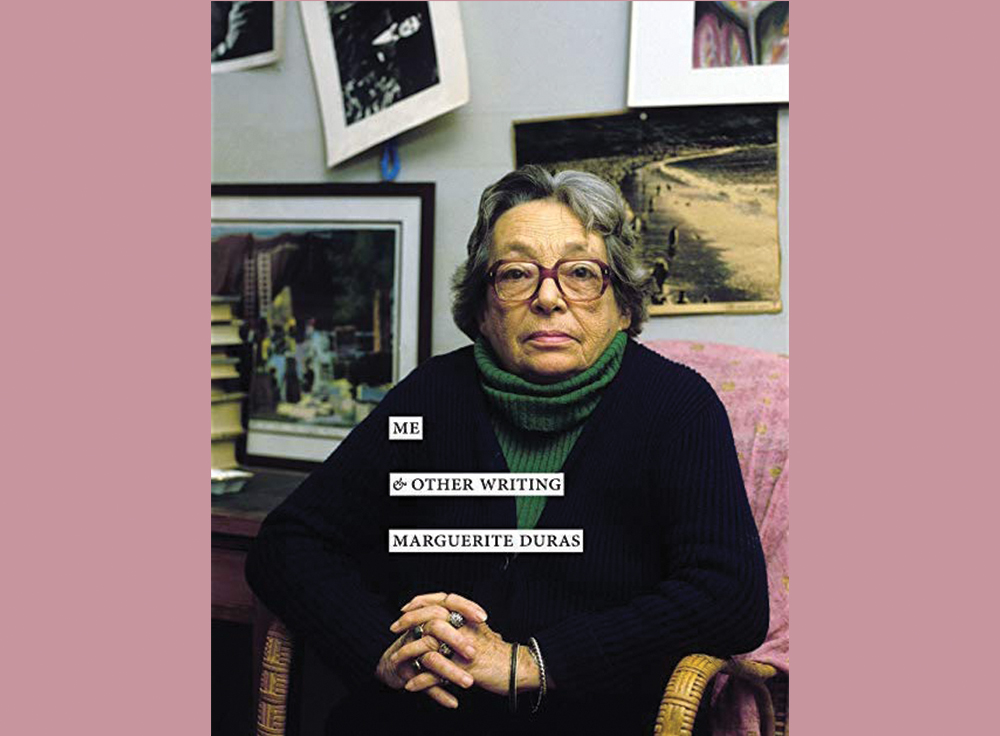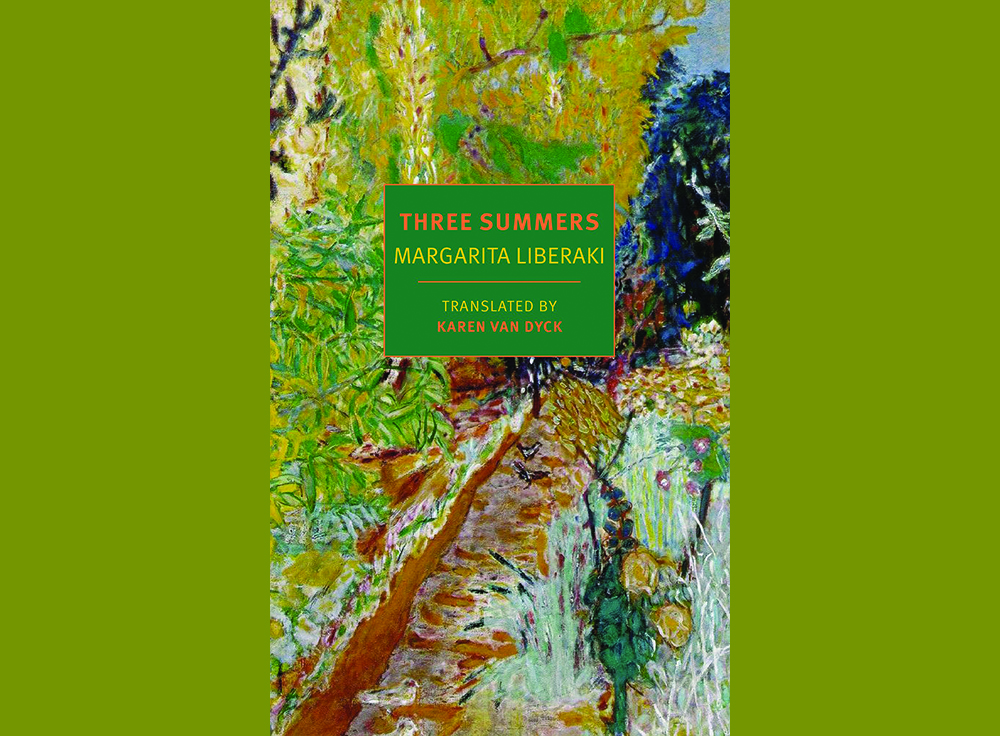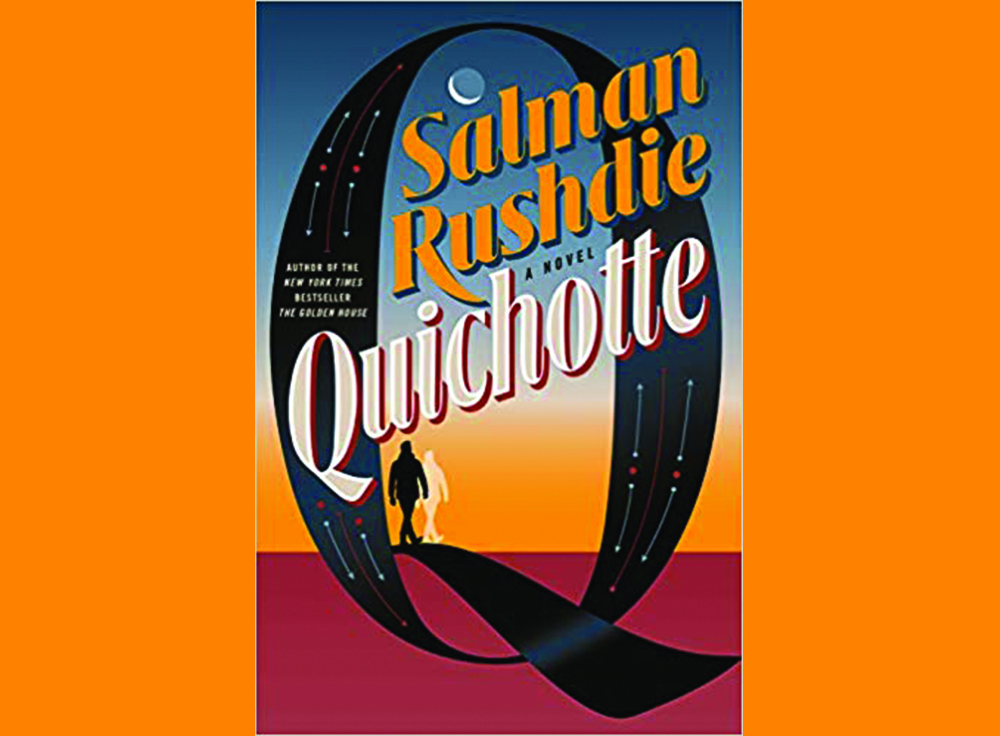While there are many things to say about philosophical weightiness of the aphorism, or about its particular wit, it is my personal feeling that the best part of an aphorism is sharing it with someone. (The form of the tweet, an aphorism made expressly for sharing, perhaps proves this point.) Lawrence Ferlinghetti’s Poetry as Insurgent Art was given to me as a token from City Lights Books by someone who had just returned from San Francisco—a tangible way of sharing an experience. It is a pocket-size book of critical compasses, statements such as “A lyric poem must rise beyond sounds found in alphabet soup” and “Like a field of sunflowers, a poem should not have to be explained.” I won’t say that lengthy analysis wouldn’t bring you the same insights, but it certainly wouldn’t give you anything as enjoyable to read aloud to a companion. —Lauren Kane
While reading Marguerite Duras, it can be hard to tell if you are pressing your hands to her chest or if she is pressing her hands to yours. Has she mined your deepest feelings or have you caught her heart’s fever. Her nonfiction, written in the same blood and seawater as her fiction, produces the same sensation. On a recent holiday, I kicked two recent works of contemporary fiction out of my beach bag in favor of Me & Other Writing, a slim new collection of Duras’s nonfiction from Dorothy Project. Duras explains, “We should write for newspapers the way we walk down the street. We write, we walk, we cross the city, it’s crossed, it ends, the walk continues, in much the same way we cross time, a date, a day and then it’s crossed, ends.” I dove into the collection without considering the forward, sailing through Duras’s descriptions of homicide and the wild genius of fashion designer, Yves Saint Laurent. Myself mad for couture, I’m reassured that Duras always saw Saint Laurent “as a writer.” It wasn’t till I was back in new york city that I made it to the diary she wrote for the French daily paper Libération. I was both in the East Village and back at the shore with Marguerite. There is something eternal in her prose: “the anger of the patriarchs is inflicted upon the bags, the women, the children, the cats, the dogs, in every social class men scream when it is time for the bags, sometimes collapse from screaming and go into cardiac arrest, while the women, a small fearful smile on their lips apologize for existing, for having committed the children, the rain, the wind, this entire miserable summer.” When I finished, I flipped back to the forward and I applaud the translators, Oliva Baes and Emma Ramadan for allowing the illusion that I missed little in translation. But I regret a little that anything would come between me and Marguerite; I’d rather not know whose tongue was whose. —Julia Berick
I strongly believe that certain books correspond to certain seasons, and that the “summer novel” is a genre unto itself. A summer novel should be reserved for those particularly indolent days when it’s too hot to do anything but read, and it comes with a few stipulations. Physically, it should be thick enough that you can easily balance it in one hand while eating fresh fruit with your other; story-wise, the plot should be twisty enough to command your attention even when you’re sweaty and restless. Ideally, when you look back on your summer, you should remember it filtered through the haze of that novel. Margarita Liberaki’s Three Summers, translated from the Greek by Karen Van Dyck, fulfills every one of these requirements and then some. The novel follows the coming-of-age of three sisters over the course of three summers in the Greek countryside, and there’s a lushness both to the prose—Liberaki is a careful chronicler of nature—and her observations concerning the relationships between sexuality, love, and family life. By the novel’s end—and by the time the heat wave I was reading it in finally broke—Three Summers fulfilled another one of my stringent summer novel requirements: it made me already nostalgic for the sweaty hours that had passed. — Rhian Sasseen
Much like Karen Olsson, author of the recent The Weil Conjectures, my first love among the two Wiel siblings was Simone. When I was a young woman, the story of Simone Weil’s intense and urgent life fueled and defined the boundaries of my own. When I read about how she was willing to starve herself in the name of the Lord, I knew I would need to develop more rigorous commitments to my own convictions. Olsson explores the value of the more subtle commitments we make to our intellectual pursuits. By interweaving the stories of Simone, her brother André Weil (a renowned mathematician), and Olsson’s own mathematical studies, Olsson makes a compelling case for a discipline that can often seem coldly unresponsive to human concerns. Olsson illuminates the beauty and humanity at the heart of mathematical endeavors, with the commitment and charisma necessary to keep laymen engaged. — Noor Qasim
When I read Midnight’s Children for the first time, as a sophomore in college, I quickly declared it my favorite novel. It’s mode of storytelling—the blend of myth and history and post-modern narration for which Rushdie became famous—was unlike anything I had ever read, astonishing for both its beauty and its strangeness. In the years since, my taste has changed, and I have mostly backed away from terms like “favorite.” But in the same way that one never fully gets over a first love, there will always be, somewhere in my depths, a candle burning at the altar of that book. I have since read other of Rushdie’s novels, but none has left quite so strong an impression. Like some others, I have found his recent work often feels overwrought. Still, I keep trying. So, it was with expectant joy that I opened this week’s New Yorker to a story adapted from his new book, Quichotte, forthcoming from Random House. A modern reimagining of Don Quixote, the story follows a bumbling and unlikely hero “of Indian origin, advancing years, and retreating mental powers” as he navigates a world he no longer understands, guided only by the light of his own delusion. There are themes that might be called “topical”— the opioid crisis, political corruption, reality television—all set aglow by Rushdie’s incandescent weirdness. The story is perhaps imperfect—its humor is a little uncool, its irony too plain, its language bombastic—but, for some reason, I didn’t mind. Maybe it’s my bias creeping in. Or maybe it’s that all of those qualities seem somehow fitting for the story at hand—a self-aware twist on a classic knight’s quest, a famous tale of absurdity and romance. I had, while reading it, brief flashes of the exhilarated wonder I felt reading Midnight’s Children all those years ago—a sense of being in the hands of a truly exceptional storyteller, a sense that anything might happen. The novel, which has been nominated for a Booker Prize, will be published in September. —Cornelia Channing
If you are a fan of downtown NYC impresario and jazz/classical/rock/unclassifiable composer John Zorn, two contradictory things are likely to be true about your relationship to his music: you own more of it than you could ever hope or want to listen to, and you can’t get enough of it. Zorn is despairingly prolific and also controls his own means of production in the form of his record label, Tzadik. Central to his oeuvre is the Masada project, his take on new Jewish music, which began in the 1990s and has spawned literally hundreds of compositions and dozens of albums by many, many bands. This summer, Zorn brings the project to a close with his final collection of Masada music, 92 compositions performed by 12 bands or performers released as a lavish 11-CD boxed set. He is also releasing each volume individually. On the one hand, this is too much music, and a lot of it sounds a lot like other Masada releases. I suppose the box is only for superfans, of which I am one. These are racing, raging, sometimes achingly gorgeous pieces of twisted klezmer-inflected music strained through countless other genres performed by virtuosos, including guitar gods Bill Frisell and Gyan Riley, the madmen of Secret Chiefs 3, and beloved pianist Craig Taborn. If you’re (understandably) not up for the deep dive, I’d recommend vol. 1, Keter, by Argentinian singer Sofia Rei, and vol. 7, Netzach, by Zorn’s Gnostic Trio, with Frisell on guitar, Carol Emanuel on Harp, and Kenny Wollessen on vibes; it’s one of the most beautiful albums ever And since this music isn’t available on streaming services, you might as well get the physical CDs because Tzadik still cares about CD packaging like it’s 1999. – Craig Morgan Teicher
from The Paris Review https://ift.tt/2SGRNSi






Comments
Post a Comment